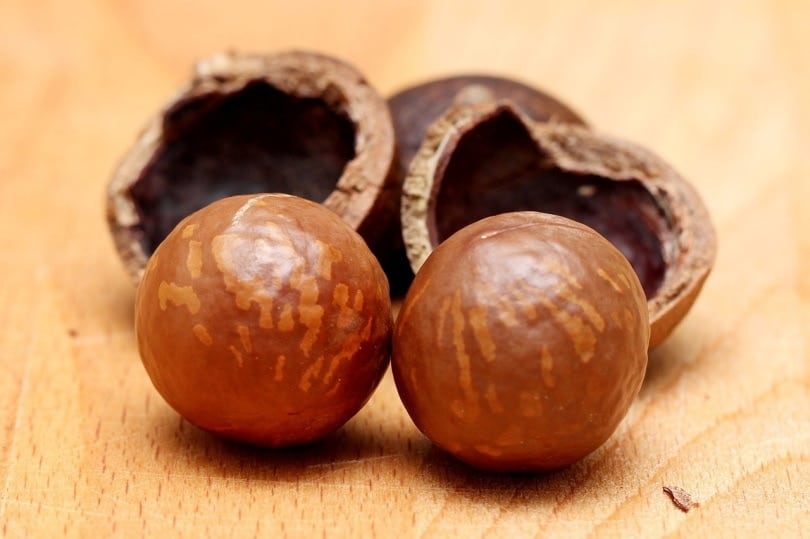Macadamia nuts are a popular snack due to their health benefits that play a part in a healthy balanced diet. They are also used widely in snacks and baked goods, in which case we usually show the macadamia nut a lot more love and adoration. Whichever way you choose to enjoy macadamia nuts, you may have a pooch that expresses interest in the nut, and you may be wondering if it’s okay to share the love? Or maybe your furry friend consumed pieces of the nuts on the floor, and you’re concerned about its effects?
Unfortunately, this tasty and healthy snack is poisonous to dogs, and although the cause of the toxicity is unknown, it is best to prevent your dog from ingesting macadamia nuts.
What Happens When a Dog Eats Macadamia Nuts?
If your dog has managed to get his paws on some macadamia nuts, you will usually notice symptoms within 12 hours of ingestion, and they can persist for 2-3 days. Symptoms will depend on how many nuts your dog ate, but If you suspect your pet has ingested macadamia nuts, some signs to look out for are:
- Vomiting
- Weakness
- Hyperthermia
- Depression
- Abdominal pain
- Reduced appetite
- Tremors
- Fever
Pancreatitis can occur if the pancreas is overstimulated, and since macadamia nuts are high in fat, pancreatitis in your dog is possible. This inflammation of the pancreas can cause lethargy, abdominal pain, vomiting, and depression, but in severe cases, it can be fatal.
It is vital to make sure that macadamia nuts are out of reach around the house, and if you are snacking, be sure to pick up any nuts that may have fallen to the floor.
The good news is that symptoms can subside on their own and only last a few days, but as soon as you are aware that your dog has ingested macadamia nuts, it is best to contact your vet for a proper diagnosis.

What Should I do if my dog has eaten Macadamia nuts?
Treatment will depend on how many nuts your dog ate, when they consumed them, and the severity of the symptoms. Most symptoms are mild, lasting about 24 hours, and include vomiting and depression. The symptoms can go away, but if your dog is vomiting continually with a fever or tremors, you should immediately get your pet to the vet. If the nuts were ingested less than 2 hours before the veterinary visit, the doctor may remove the nuts from their stomach by emesis, which induces vomiting and will reduce the chances of toxins being absorbed. If your dog hasn’t ingested many nuts, your vet may try activated charcoal to help absorb the toxins and protect the lining of the stomach.
If your pup has continued vomiting for more than 24 hours and appears to be in pain with no appetite, it is likely that pancreatitis has developed, and the animal will need supportive care, like IV fluids from the vet. Your furry friend may have to stay the night in the hospital to be monitored while they bring down the fever and treat your dog with the necessary medication.
Are other nuts toxic to dogs?
It would make sense that nuts are a healthy snack for your dog as they provide healthy fats that dogs need in their diet, but what is healthy for humans is not necessarily healthy for canines.
Most nuts are high in fat and calories, which can cause weight gain, gastrointestinal discomfort, and possibly pancreatitis. Salt and spices are added to nuts as a coating or seasoning, and too much salt can cause an increase in blood pressure and any underlying kidney conditions to worsen.
It is best to keep nuts out of your dog’s diet and stick to protein-based snacks. Dogs can get healthy and safe sources of fats from fish, poultry, beef, and other animal fats.
Final Thoughts
There are many options for safer treats that are lower in calories, fat, and salt than macadamia nuts. Even though they are popular for their great savory taste and many health benefits, it is best to keep them in your trail mix and out of your canine’s diet.
Featured Image Credit: Pixabay
















